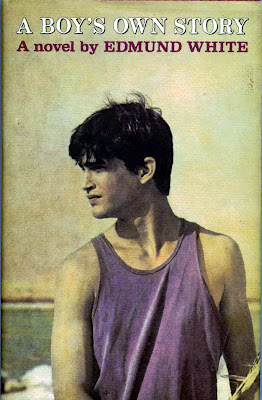Gay Thursdays: A Boy's Own Story

Twenty-five years ago in September, 1982 what was virtually an instant gay literature classic was released--Edmund White's A Boy's Own Story.
After States of Desire, White said he wanted to do one life in depth. He came up with an individual journey, a personal history, a personal American history through adolescent territory.
Although it is the story of a teenage homosexual coming to terms with his sexuality, it is also the picture of a boy growing into manhood and coming to terms with his power and his power to love. The reader is invited to think through a retrospective into internalized oppression, into pre-liberation consciousness.
"When I was child and wanted an older lover, he was envisioned as a savior, someone who would free me from the tyranny of my parents, who would value me." (E.W. in States of Desire)
White referred to the 60s--at the time of the book's release in 1982--as an era of unconscious in Art in which the artist struggled to get at his genius to "derange himself." The protagonist in A Boy's Own Story gives himself to similar business: he arrives at the point where he is "not a boy at all, but a principle of power."
According to White, "A writer's responsibility is to show characters in this period as as somewhat deformed," that is, victims of internalized oppression. He has indeed created a charming, intelligent hero, yet reared in a selfish individualistic point of view--an historical symbol, if you will of the modern gay movement.
In 1982, White believed that "we are emerging as a real force," but that power needed to be used wisely, much as its young counterpart in this novel. Traditionally gay people have identified, sympathized and empathized with the marginalized and the underdogs within society and White encouraged the community not to forget that allegiance. He was addressing a tendency to be indifferent and abandon the working class. All of this was opined, of course, before the movement, the community and White himself were sideswiped by the onslaught of AIDS and HIV. The plague was only a bit more than a year old.
There was then and now a virulent anarchic stance within the American mentality, something which makes White's hero understandable. In the anarchic, selfish sense, he has yet to learn to use his power wisely or unselfishly. He is seductive, grandiose and ultimately sinister. Given his charm and intelligence, he is a two edged sword of a sort. He seduces the reader into following him through an abyss of power and male sexuality, a misdirected path in which he virtually turns into the oppressor from which he yearns to be free.
The reader is warned, "I wanted someone to love me. Someone adult. Someone under my power."
White wrote a collective and respective mirror. "Neither my father nor I moved very gracefully over that boat. We were both afraid of the water, he because he couldn't swim, I because I was afraid of everything." Rather than consider this vivid portrait of a personality an excellent study of the parent-child polarity full of psychoanalytic symbolism, White called it a "history of moods." He added, "Psychology loves stories which actually falsify experience." In his opinion human decisions are more "influenced by pure accidents of the moment or of the environment ... The ideal novel has no subject at all, with style and mood replacing plot." It is not White's intention in this book to imply the traumatic cause and effect relationship of psychoanalytical narrative.
Edmund White is the architect of a style so rich and intricate taking us to a resolution beyond the adolescent experience in A Boy's Own Story--"history of moods" notwithstanding--with the grown up author reflecting on and embracing the teenager within. He called it "a coming to terms with the post-liberation aspect, the prefiguring of happiness." It takes place well before the novel's conclusion, but it is clearly its true destination.
This comes from a conversation with the author that took place around the time of a 1982 book signing he did for this milestone in gay reading at the gay bookstore par excellence, Giovanni's Room of Philadelphia.

"Intellectuals have often imagined I must have a trained and well-stocked mind," he writes, "whereas in fact all I have is an alert face, a quick tongue and a few journalistic tricks."

Comments